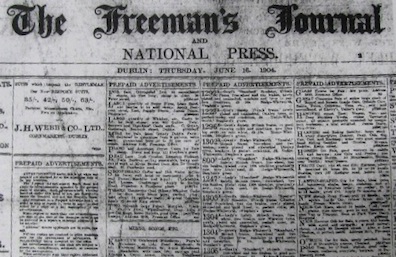The Freeman's Journal, often called simply the "Freeman"
in Ulysses, was one of Dublin's daily newspapers. This nationalist
publication (a designation more deserved at some times than at
others) was Ireland's first truly national paper during the
19th century, and in 1904 its circulation was so large that it
could claim, in weekly ads, to be "the leading Irish
newspaper." Leopold Bloom works for the paper lining
up ads—in Lestrygonians Nosey Flynn tells Davy Byrne
that "He does canvassing for the Freeman"—and from Lotus
Eaters to Sirens Bloom carries around a copy of
the June 16 issue.
The Freeman's Journal was founded in 1763 by Charles
Lucas as a voice for the ecumenical Protestant nationalism
that produced leaders like Henry Grattan and Henry Flood and,
later, Wolfe Tone and Robert Emmet. The paper regressed to
more pro-British views from 1784 to 1802 under the editorship
of Francis Higgins, the "Sham
Squire," but it regained its moral footing in the 19th
century, especially under the ownership of Sir John Gray from the
1840s to the early 70s, when it advocated for land reform,
disestablishment of the Church of Ireland, and Catholic civil
rights. Gray's son, Edmund Dwyer Gray, took over management of
the paper in 1875 and involved it in the nationalist campaign
for Home Rule, which made it hated and feared in England.
Ambivalent attitudes toward Charles Stewart Parnell that
originated with John Gray kept the paper loyal to the great
Irish parliamentary leader in the immediate aftermath of the
O'Shea divorce scandal that tore apart his party, but finally
caused it to renounce him in September 1891. In March 1892 the
Freeman merged with a paper called the National
Press, resulting in the full name used twice in Ulysses,
the "Freeman's Journal and National Press."
In 1924 the paper was acquired by the Irish Independent,
a paper that had been launched in late 1891 to support the
Parnellite cause. For many decades the masthead of the Independent
proclaimed that it had swallowed up the Freeman.
Having thought in Calypso about his paper's logo of
a homerule sun rising up in
the northwest, Bloom walks around with a copy of the
day's Freeman throughout Lotus Eaters. He
carries it in a sidepocket of his jacket, rolls it up
lengthwise into a "baton" and taps his leg with it,
sticks it in his armpit, unfolds it to look at ads, and uses
it to shield Martha Clifford's letter from view. Most
consequentially, he lends it to Bantam Lyons and takes it back
after offering to let Lyons keep it. It is this paper that
persuades Lyons to put down money on the horse Throwaway,
because Bloom says, "I was just going to throw it away." Ithaca
looks back on the decisive impact that Bloom's newspaper
had "when, when Frederick M. (Bantam) Lyons had
rapidly and successively requested, perused and restituted the
copy of the current issue of the Freeman’s
Journal and National Press which
he had been about to throw away (subsequently thrown
away), he had proceeded towards the oriental edifice of the Turkish and Warm Baths, 11
Leinster street, with the light of inspiration shining in his
countenance and bearing in his arms the secret of the race,
graven in the language of prediction."
Knowing that Bloom has "subsequently thrown away" the paper
raises the question of whether the novel has represented this
action. No surprise: it has. In Hades Bloom is still
holding it as he steps out of the carriage, and in the
mortuary chapel he unfolds it to kneel upon. At the end of Lestrygonians
he finds it still in his coat pocket as he rummages for his
lemon soap: "Try all pockets. Handker. Freeman. Where
did I? Ah, yes. Trousers. Potato. Purse. Where?" Sirens
shows it still to be in his possession in the Ormond dining
room, performing the same trick of shielding clandestine
correspondence as he composes a reply to Martha: "Down the
edge of his Freeman baton
ranged Bloom’s, your other eye, scanning for where did I see
that. Callan, Coleman, Dignam Patrick. Heigho! Heigho!
Fawcett. Aha! Just I was looking... / Hope he’s not looking,
cute as a rat. He held unfurled his Freeman. Can’t
see now."
But somewhat later in Sirens, as he thinks about
getting out of the Ormond bar before Ben Dollard finishes
singing The Croppy Boy,
Bloom's thoughts indicate that he will leave the paper lying
on the restaurant table: "Get out before the end. Thanks, that
was heavenly. Where's my hat. Pass by her. Can leave that
Freeman."
